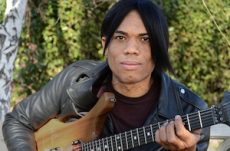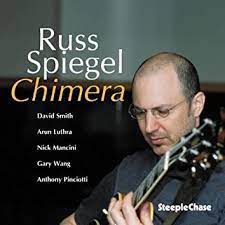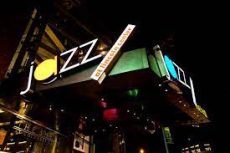
Requisites
Joy Spring ~ Joe Pass Quartet | By Eddie Carter
One of my favorite guitarists, Joe Pass, enters this morning’s spotlight with a 1964 live date that sat in the vault for seventeen years. Joy Spring (Blue Note Classic LT-1103) by The Joe Pass Quartet showcases their February 6 performance at the Encore Theatre. Joe is joined on stage by Mike Wofford on piano, Jim Hughart on bass, and Colin Bailey on drums. My copy is the original 1981 US Stereo release. Side One opens with the title tune Joy Spring by Clifford Brown. The quartet establishes the theme leisurely, paving the way for Joe to take a happy strut on the first reading. Mike cruises comfortably through the following statement, then Jim concludes with a laid-back walk toward the finale and the crowd’s ovation.
Some Time Ago by Sergio Mihanovich begins with a beautiful introduction by Wofford. Pass leads the quartet in an exceptionally gentle melody, then devotes an equal degree of care to the first interpretation. Wofford makes the subsequent point with an affectionate touch ahead of the guitarist’s thoughtfully tender climax. The tempo moves upward for the ensemble’s spirited theme to The Night Has A Thousand Eyes by Buddy Bernier and Jerry Branin. Joe takes the first solo spot and swings with an intensity that builds excitement as it unfolds. Mike keeps the beat going with a brisk workout complemented by Jim and Colin’s lively accompaniment ahead of the quartet’s reprise and disappearance to the audience’s applause.
Side Two starts with Relaxin’ at Camarillo by Charlie Parker. The title refers to Parker’s six-month recovery from alcohol and drug addiction at the California State Hospital. The quartet sets the mood for what follows in an easy-swinging theme. Pass is given considerable space for an enjoyable opening statement, then Wofford has something to say in an impressive performance. Hughart takes a jaunty stroll in the closing reading into the theme restatement. There Is No Greater Love by Isham Jones, and Marty Symes begins with a guitar and piano duet, segueing into the ensemble’s blissful melody. Joe opens with a very engaging statement, then Mike delivers a charming presentation. Jim puts an exclamation point in the closing interpretation preceding the quartet’s soft summation.
Richard Bock produced Joy Spring, and Dino Lappas recorded the quartet’s performance. The sound quality is excellent, with an exquisite soundstage. Everyone is in top form, and the ensemble never fails to satisfy during this set of irresistibly enticing music. In a career lasting five decades, Joe Pass was regarded by critics and fans alike as one of the most gifted musicians in jazz. His discography as a leader and a sideman is extensive, and he always brought something unique to each session. Joe’s solo albums and work with Ella Fitzgerald and Oscar Peterson have also stood the test of time. He died from liver cancer at age sixty-five on May 23, 1994. If you like jazz guitar and are a fan of Joe Pass, I invite you to check out Joy Spring by The Joe Pass Quartet on your next vinyl hunt. It’s a beautiful live performance that’s easy on the ears and merits sincere consideration for any jazz library!
~ The Night Has a Thousand Eyes; There Is No Greater Love – Source: JazzStandards.com ~ Joy Spring, Relaxing at Camarillo – Source: Wikipedia.org © 2023 by Edward Thomas Carter
More Posts: choice,classic,collectible,collector,guitar,history,instrumental,jazz,music

STANLEY JORDAN
In a career that took flight in 1985 with commercial and critical acclaim, guitar virtuoso Stanley Jordan has consistently displayed a chameleonic musical persona of openness, imagination, versatility and maverick daring. Be it bold reinventions of classical masterpieces or soulful explorations through pop-rock hits, to blazing straight ahead jazz forays and ultramodern improvisational works—solo or with a group—Jordan can always be counted on to take listeners on breathless journeys into the unexpected.
Key to Jordan’s fast-track acclaim was his mastery of a special technique on the guitar’s fretboard. Instead of conventional strumming and picking, Jordan’s innovative “touch technique” is an advanced form of two-handed tapping. While a handful of other players were using similar techniques, Stanley’s fluid, multi-layered textures and sheer virtuosity raised the bar for excellence. But his technique, though impressive, is always a means to a musical end. His music is imbued with a warmth and sensitivity that has captured the imagination of listeners worldwide. A classically trained pianist before playing guitar, Jordan wanted greater freedom in voicing chords on his guitar, so, he applied piano principles to do so. Jordan’s touch technique allows the guitarist to play melody and chords simultaneously with an unprecedented level of independence. It also allows Jordan to play simultaneously on two different guitars, or even on guitar and piano. He says that “I think of it as a single instrument, but one with a wide range of tonal colors—that’s why I do it.”
Stanley Jordan has performed in over 60 countries, on some of the biggest stages and festivals worldwide. He’s a unique performer who routinely leaves his audience mesmerized.
*FIU and UM student tickets are discounted to $20. Students must show a valid student ID at the door when presenting your student ticket.
More Posts: adventure,album,club,festival,genius,guitar,jazz,museum,music,preserving,restaurant,travel

Daily Dose Of Jazz…
Russ Spiegel was born March 30, 1962 in Los Angeles, California, and raised in Santa Monica, California. His family was musical as he has an older sister who plays the bluegrass fiddle, a pianist and composer brother and a father who is an avid amateur jazz trumpeter.
A fan of pop radio as a youngster, Russ discovered rock music as he entered his teens. Picking up the electric guitar he took lessons at a local music store, eventually buying a Fender Stratocaster. He started jamming with area musicians, which led to forming a rock cover band. Finishing high school in Frankfurt, Germany he enrolled in the University of Maryland that had a campus in Munich, Germany. While there, he formed a progressive-rock band, joined a local R&B and soul unit, and began learning jazz standards. In 1982 Spiegel returned to the U.S. to complete his bachelor’s degree at the University of Michigan, in Ann Arbor, earning a degree in philosophy.
In 1986 had Spiegel in Boston, Massachusetts on scholarship at Berklee College of Music. Upon completion of his studies, he relocated to Germany in 1988 where he gradually made contacts in the music world. He began playing on military bases and at local jazz clubs and festivals. During a stint in Paris, France he formed a quartet called Guitar Hell, which toured widely in France and Germany. He soon found himself in demand as a guitarist and electric bassist with various European big bands, jazz ensembles, and blues groups.
Around the same time, Russ joined the band of German jazz organist Barbara Dennerlein and toured Europe with her before receiving the coveted Jazz Scholarship by the city of Frankfurt for his contributions to the city’s artistic scene.
In 2001 Spiegel returned to the U.S. settled in New York City and studied under teachers Adam Rogers, Paul Bollenback, Ben Monder and John Patitucci, receiving his master’s degree in jazz performance from the City College of New York.
In 2008 his Jazz/North Indian classical fusion ensemble, Sundar Shor, undertook a tour of India under the auspices of the American Center, and it has toured widely in Europe as well. Guitarist Russ Spiegel continues to perform and record.
More Posts: bandleader,guitar,history,instrumental,jazz,music

JEREMEY POPARAD JAZZ ORCHESTRA
To celebrate his 40th, Jeremey has called upon his friends in the Norhteast Ohio jazz scene for an evening of all original compositions and arrangemenets by Jeremey as well as Andrew Wegierski of the Danjo Jazz Orchestra and Bryan Kennard, director of The Bop Stop. The evening will feature two special guest vocalists from groups that Jeremey performs with: Bassel Almadani from Bassel and the Supernaturals and Heidi Swinford of Axon-Neuron. The band for the evening includes:
Flute: Bryan Kennard
Saxophones: Chris Coles, Nathan-Paul Davis, AJ Kluth, BJ Quimby, Brad Wagner
Trumpets: Tim Coyne, Garret Folgler, Mark Russo, Tommy Lehman
Trombones: BJ Bishop, Eric Dregne, Mark Mauldin, Andrew Wegierski
Rhythm: Andru Dennis, piano; Jeremey Poparad, guitar; Kevin Martinez, bass; Anthony Taddeo, drums
More Posts: adventure,album,club,festival,genius,guitar,jazz,museum,music,preserving,restaurant,travel

The Jazz Voyager
The Jazz Voyager is back once more on a flight to the nation’s capital to the Big Apple. I’ll be giving my regards to Broadway before heading up a few blocks to 10 Columbus Circle 10019 where the Appel Room is located within Jazz At Lincoln Center. It will be a night of Brazilian music and romance with vocalist Rosa Passos.
Based on the design of a Greek amphitheater, The Appel Room merges luxuriant splendor with functional accessibility. One glance at the dramatic 50′ × 83′ wall of glass confirms that The Appel Room possesses one of New York City’s greatest backdrops—Central Park and the Manhattan skyline. Several mechanical tiers make up the fluid inner structure of the amphitheater, offering a strikingly adaptable layout. This ingenious design allows for a smooth transformation from supper-club or event mode to theater mode. For additional capability, The Appel Room features a removable stage on its bottom level.
Vocalist Rosa Passos reunites with NEA Jazz Masters Kenny Barron and Ron Carter in the Appel Room for the first time together. While Passos has been called the female João Gilberto, she is a prolific and distinct vocalist and guitarist with a playful yet sophisticated style, marked by perfect pitch and spacious elegance. Enhancing this meeting of these three masters is first-call Brazilian drummer, Rafael Barata.
The Appel Room is located at 10 Columbus Circle, New York City 10019. For more info 212~258-9800 or visit https://2023.jazz.org/rosa-passos-with-kenny-barron-and-ron-carter
More Posts: adventure,album,club,festival,genius,guitar,jazz,museum,music,preserving,restaurant,travel,vocal



